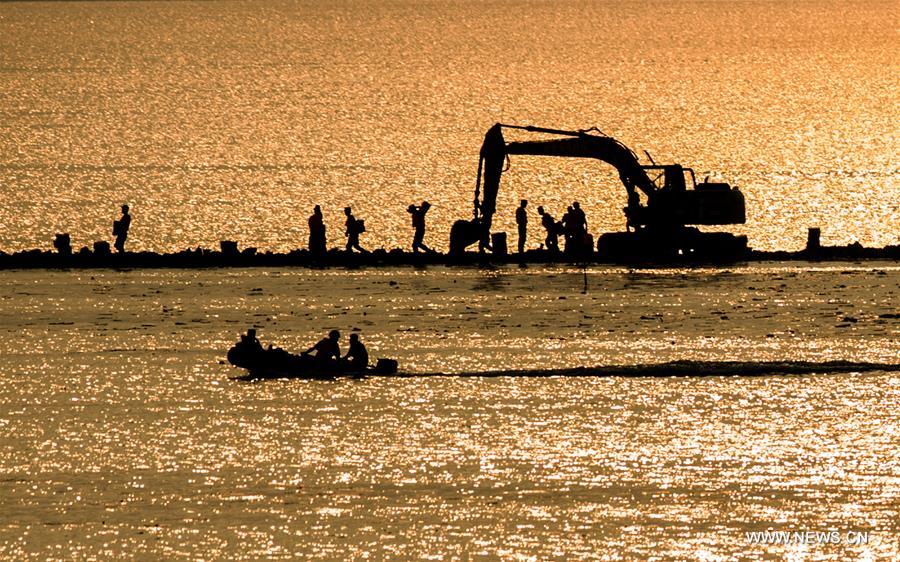Hubei to blow up dike to disperse floodwater
Xinhua, July 14, 2016 Adjust font size:

Armed police soldiers prepare for the breach of the embankment on the dike of Niushan Lake in central China's Hubei Province, July 13, 2016. The Hubei provincial government Tuesday decided to break the embankment between Liangzi Lake and Niushan Lake, to prevent possible flood overflow over the dike. The operation will be executed on July 14. (Xinhua/Xiao Yijiu)
Armed police will blow up a dike between two lakes in central China's Hubei Province on Thursday morning to disperse surging floodwater.
They will destroy the 3.7-km-long embankment separating Liangzi Lake and Niushan Lake at 6:30 a.m. with 30 tonnes of explosives, said Ren Zhenhe, vice governor of Hubei, at a press conference on Wednesday afternoon.
Hubei has been among the regions worst hit by the recent deadly downpours in China. Due to persistent rain since mid-June, the water level of Liangzi, the province's second-largest lake, is more than a meter higher than that of Niushan, which is located on the other side of the dike in the southeastern suburbs of Wuhan City.
By 8 a.m. on Tuesday, Liangzi's water level had risen to 21.48 meters, 12 cm above the safe level and 5 cm higher than the record high.
Liangzi's pumping station has been working flat out for 80 days, clearing more than 1.3 billion cubic meters of water out of the lake and into the Yangtze River. The amount is double the average for this time of year, but the effort has only reduced the water level by one cm per day.
Heavy rain is forecast in Hubei up to July 18, which is expected to raise the water level of Liangzi to 22.38 meters and cause severe waterlogging.
Following the explosion, Niushan Lake will be merged into Liangzi, and therefore the surface area of Liangzi will grow by more than 100 square km to about 370 square km.
About 50 million cubic meters of water from Liangzi Lake will flow to the Niushan side, submerging low-lying land around Niushan Lake.
As of noon on Wednesday, 1,658 local residents had been evacuated to make way for the dike explosion and water flow, according to Long Zhengcai, vice mayor of Wuhan.
Among them are 261 employees plus their family members of the Niushan Lake aquatic farm, which will disappear following the operation.
On Wednesday morning, a Xinhua reporter saw dozens of trucks sent by the government of Wuhan's Jiangxia District helping residents flee their homes.
Zhao Yunju, a 66-year-old retiree from the aquatic farm, said her family received the order to leave at 1 a.m. on Wednesday. "We've lived here for nearly 40 years. Of course we're reluctant to go, but the government said that this is for the sake of our safety," Zhao said.
"I'll leave. Just allow me to stay a little longer, for one last look at the lake," said Li Xianming, 62, wiping away tears.
The district government of Jiangxi has promised to build new homes for those relocated and compensate them, said Chen Xiexin, chief of the district's Communist Party of China committee.
Chen said the government would work on getting them new employment and social insurance.
Rain in the Yangtze River basin has left 161 people dead another 61 unaccounted for since China entered the flood season in March, according to the Yangtze River flood control headquarters.
